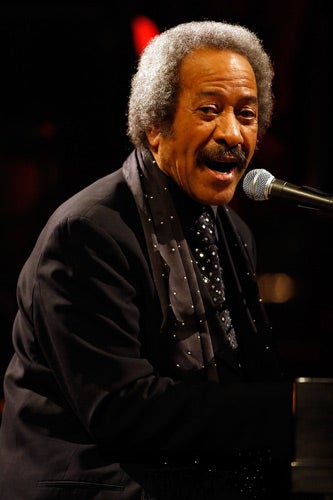Allen Toussaint, Roundhouse, London

Allen Toussaint talks of his sporadic, unbought solo work and the royalties from the hits he's created for others with equal affection.
The 70-year-old New Orleans legend has written, produced and arranged for The Band, Glen Campbell, the Pointer Sisters and most points in between, while staying rooted in his home city's R&B.
A student of Professor Longhair's second-line piano style, half a century of priceless pop history is in his fingers. Toussaint wears all this lightly. But just as I'm thinking how his rarely heard voice brushes his songs just enough to get them out, his band drop away, leaving his piano. His hands skip and flick the keys, on this rolling, urban, river dance music, intricate but easy; not just a tributary to rock'n'roll, but a parallel 20th-century source. Ten seconds like that can keep you going for a week.
With his deadpan, hooded eyes, flashing smile and droll walk, Toussaint barely has to sing. When, during "Mister Mardi Gras", he strolls through the crowd, doling out baubles and masks to those who least want them, it's impish and lovely. The Roundhouse has been turned into a candlelit supper club for him. And where his friend, Dr John, disguises his showbiz instincts in a persona of eerie hoodoo, Toussaint balances New Orleans tradition with sometimes schmaltzy hit-making, as with "What Do You Want the Girl To Do?" (a 1976 Boz Scaggs smash). Barbra Streisand and Fats Domino could have come to his door, and both left with something of bespoke sophistication.
The early-Sixties hardcore New Orleans hits – Ernie K-Doe's "Mother-in-Law", Benny Spellman's "Fortune Teller" and Lee Dorsey's "Working in the Coal Mine" – become a casually effective medley. The indomitable 1970 civil rights funk anthem "Yes We Can" is still built on one chord. His 2006 collaboration with Elvis Costello, The River in Reverse, is ignored for his 1974 one with Glaswegian Frankie Miller. But it is when his powerful old saxophonist, Breeze, takes over to sing a traditional song of Bourbon Street, in a warm croak recalling Louis Armstrong and Professor Longhair, and Toussaint's piano intercedes with off-hand, off-beat ease, that the Crescent City comes alive. The "hot spots" being growled of were mostly sunk by Katrina. That lost city lives on most defiantly in such songs, and in Toussaint's own ineffable grace.
Join our commenting forum
Join thought-provoking conversations, follow other Independent readers and see their replies
Comments
Bookmark popover
Removed from bookmarks